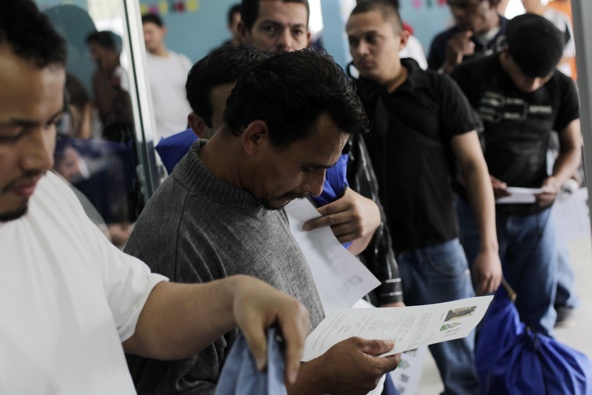
WASHINGTON (CNS) — Thousands of people in Miami, New Jersey, Boston, California, Illinois and other places gathered in early April to call for immigration reform legislation, to urge an end to deportation policies that separate families, and generally to open a nationwide push for immigration-focused changes aimed at Congress and the White House.
Those events — several of them held April 6 or 7 — will lead up to an April 10 rally on the West Lawn of the U.S. Capitol. There, an expected tens of thousands of people will call on Congress to move faster on comprehensive immigration reform legislation that is seen to have the best chance for passage since the 1980s.
Another theme of speeches at the afternoon rally, and of the messages participants will bring to Congress in lobbying meetings that day, will be a push to change current deportation policies, which end up separating families across borders, said supporters of the events in teleconferences for reporters in early April.
The so-called “gang of eight,” a bipartisan panel of senators working on an immigration reform bill intended to appeal to both parties had hoped to release their draft legislation as soon as they returned from a two-week break April 8. Advocates working with the senators and their staffs on the bill told reporters April 8 that the bill wasn’t quite ready but that perhaps it would be introduced by the end of the week. It’s estimated to be about 1,500 pages long.
“We’ve been here before, said Gustavo Torres, executive director of the social services organization CASA de Maryland, who helped organize the April 10 rally, in an April 8 teleconference.
In 2006, massive rallies and marches around the country drew hundreds of thousands of people to call attention to a then-pending immigration bill that ultimately went nowhere.
“But this time it’s different,” said Torres. He cited the November election results in which Latino voters helped re-elect President Barack Obama and provided a crucial margin in electing other Democrats as well.
“Politicians learned in the last election cycle, you ignore Latinos and immigrants at your own peril,” he said.
In a teleconference the previous week in which faith and labor leaders focused on how families are affected by current policies, Kevin Appleby, director of migration policy for the U.S. Conference of Catholic Bishops, said that keeping families together is a crucial social element of the immigration system.
“We need to be mindful that family unity strengthens the social backbone” of the country, he said.
A proposal to require immigrants already in the United States to go home in order to legalize their status, for example, would be one more way the immigration system separates families, Appleby said.
“If the goal here is to get people regularized, we shouldn’t put up barriers to making that happen,” he said. “If we give people a half loaf, this issue is going to fester into the future.”
AFL-CIO president Richard Trumka on that teleconference noted that labor and business leaders had come to a consensus about how to expand the number of visas available annually. But, he added, “family reunification is a core tenet of our immigration policy in the labor movement.”
“Some are trying to pit economic interests against families,” Trumka said, as if the value of admitting a worker’s brother, sister or child is less important than another worker.
“That’s backward,” Trumka said. “Strong families are critical to economic growth,” but more importantly, he added, it’s a moral value.
“American immigration policy must recognize that employment and family reunification are integrated,” Trumka said.
In addition to the rallies before April 10, dozens of cities will host local events the same day, and more actions are planned in coming weeks, particularly around May 1, a traditional day for workers’ rights events.
Events in late March and early May included, for instance, several events timed to coordinate with the birthday of the late migrant labor leader Cesar Chavez, and an April 6 march and rally in Miami’s Little Havana neighborhood where many signs urged U.S. Sen. Marco Rubio of Florida, one of the Republican members of the “gang of eight,” to be sure to protect families in the legislation.
In Modesto, Calif., April 2, about 1,500 people were reported at an immigration forum at St. Stanislaus Catholic Church. Rep. Trey Gowdy, R-S.C., chairman of the House Subcommittee on Immigration and Border Security, heard from immigrants and farmers, supporters and opponents of various types of immigration reform.
Also April 6, an estimated 7,000 people were reported at a rally at Liberty State Park in Jersey City, N.J., attended by Sen. Robert Menendez, D-N.J., and two Democratic members of the House, Reps. Frank Pallone and Rush Holt.
Among the events in Washington April 10 will be a Mass at St. Aloysius Church at 10 a.m., a few blocks from Capitol Hill.
The lengthy list of organizations formally participating in the rally on Capitol Hill are Catholic parishes from Virginia, Washington and Maryland, union and business groups, social service and civil rights organizations, teachers and Hispanic ministry offices of nearby dioceses and archdioceses.
—
— By Patricia Zapor, Catholic News Service






